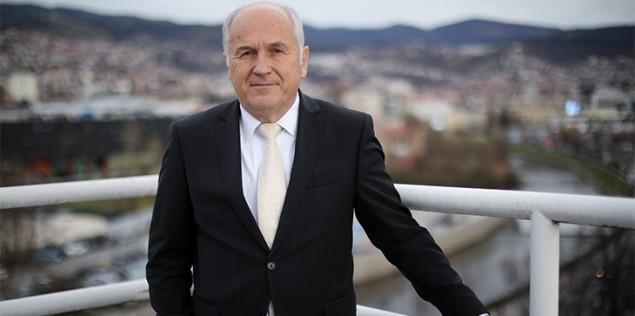Intl. admin. on Dayton Agreement anniversary: Citizens want to set a new course

Bosnia’s citizens demand to live in a society that respects all citizens and “time and again, the impetus for positive change has come not in the first instance from political leaders but the people themselves,” Bosnia’s international administrator said in his speech on Saturday to mark the 25th anniversary of the Dayton Peace Agreement.
“Twenty-five years have passed since the Dayton Peace Agreement ended the war in Bosnia and Herzegovina. The country today faces formidable challenges, but as we address these challenges, let us not forget that Dayton has kept the peace,” Valentin Inzko began his speech.
"And peace has to be cherished, especially if we keep in mind the conflicts in the Middle East, the Caucasus, or the refugee crisis,” he continued.
Inzko is the High Representative in Bosnia and Herzegovina, the international official in charge of overseeing the civilian implementation of the Dayton Peace Agreement, which ended the Bosnian war when it was signed on November 21, 1995.
Inzko stressed that “peace is not the end, but a starting point,” as he quoted late former High Representative, Paddy Ashdown, who said that "Dayton is the foundation, not the ceiling."
“It is the foundation for the country we are working to build and upgrade together,” Inzko said.
The High Representative argued that peace has enabled the country to progress, “even though we are moving much more slowly than citizens have a right to expect.”
He pointed out that, within the first decade after the peace agreement was signed, thousands of citizens have returned to their homes and the country introduced its own currency, “one of the most stable ones in Europe”, as well as biometric passports and ID cards, common licence plates, and the flag and national anthem.
“An indirect tax system – far ahead of anything in the region – was created, and the police and judicial system were reformed. The BiH Armed Forces were established and have distinguished themselves in flood relief and other activities at home as well as serving in international peacekeeping deployments around the world,” he said.
The Austrian diplomat argued that the Office of the High Representative (OHR) was the “a major driver of these reforms” and that a special set of powers that were given to High Representatives in 1997, the Bonn Powers, were of “essential and effective during the first phase of recovery.”
The Bonn Powers allow High Representatives to impose laws and fire officials, among other things. Inzko said that officials who served the post before him used them in order to provide Bosnia with “the institutional and legal infrastructure required to function as a modern democracy.”
He thanked his predecessors: Carl Bildt, Carlos Westendorp, Wolfgang Petritsch, Christian Schwarz Schilling, Miroslav Lajcak and late Paddy Ashdown for all they have done for Bosnia.
Bosnia’s citizens have demanded and still demand the right to live in a society that respects all citizens, that provides schools and good hospitals and public amenities, and offers decent jobs and economic opportunities, he said.
“Time and again, the impetus for positive change has come not in the first instance from political leaders but the people themselves,” Inzko stressed.
The families of those who were killed or went missing in the Bosnian war “came together from every community for a common cause, to ensure that their loved ones are remembered with dignity and with respect,” while “the families of those who have suffered because of corruption and inefficiency have come together in citizens’ initiatives to demand accountability,” he explained.
“Yet, the pace of progress has slowed almost to a halt, and people – especially young people – are leaving Bosnia and Herzegovina. They are moving to countries that provide economic opportunity under and the rule of law, good governance, and normal life,” Inzko noted, adding that the International Community is working and will continue to work towards ending impunity for those in Bosnia “who are violent or powerful or both” and to strengthen the institutions that protect citizens.
“I believe the people of Bosnia and Herzegovina want to set a new course. I believe they can succeed with robust and consistent support from international partners. Change can be delivered even within the Dayton system.”
The international administrator said that the Dayton Agreement does not give anyone the right “to challenge the country or its people” but gives “every citizen the right to build a decent life with dignity and security.”
He argued that Bosnians can be confident that their partners in the International Community “will stand with them as they move steadily and resolutely along this road.”
“This road can and ought to be more decisive than in the past decade, and it should encompass the successful elements from the first ten years which saw the state, the entities and the cantons progress the fastest,” he said.
Inzko said that he is convinced that the year 2021 “can open a new and more successful chapter in Bosnia and Herzegovina in the interest of all, and especially in the interest of the wonderful people of this country.”
Kakvo je tvoje mišljenje o ovome?
Učestvuj u diskusiji ili pročitaj komentare





 Srbija
Srbija
 Hrvatska
Hrvatska
 Slovenija
Slovenija







